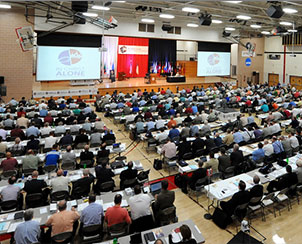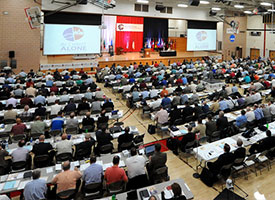By Paula Schlueter Ross
Meeting in convention July 29-Aug. 1 in New Ulm, Minn., some 400 delegates of the Wisconsin Evangelical Lutheran Synod (WELS) voted to encourage the church body’s leadership “to continue discussions with the LCMS to strive for true unity based on full agreement in doctrine and practice.”

The resolution — adopted unanimously by voice vote — also asks “that we pray for the Holy Spirit to guide and bless these efforts to God’s glory and for the benefit of His church.”
The Milwaukee-based WELS’ 62nd Biennial Convention was held at Martin Luther College in New Ulm under the theme “In Christ Alone.”
The adopted resolution acknowledges that fellowship between the two church bodies was “suspended” in 1961 and that “the Lord opened doors to informal discussions with the LCMS in December 2012.” Another round of talks is planned for this December.
The resolution adds that, “even if the restoration of fellowship is not possible in the near future, we believe it is our responsibility to each other and to our Lord to strive for true unity based on full agreement in doctrine and practice.”
The Rev. Dr. Albert B. Collver, director of LCMS Church Relations, notes that a similar resolution was adopted by the 2013 LCMS convention. Resolution 4-05 calls for continued discussions between the Synod, the WELS and the Evangelical Lutheran Synod.
“Attending the WELS convention in New Ulm is the first step in fulfilling this [LCMS] resolution,” Collver said in a blog post.
Collver was an official observer at the WELS convention along with the Rev. Jon Vieker, assistant to LCMS President Rev. Dr. Matthew C. Harrison, and the Rev. Larry M. Vogel, associate executive director of the LCMS Commission on Theology and Church Relations. A WELS representative — the Rev. Paul Prange, administrator for Ministerial Education — attended this summer’s LCMS convention as an observer.
When LCMS and WELS representatives sit down together in December (at a time and place to be determined), Vogel said, “I don’t think either of our churches is entering these conversations with any immediate expectation, much less stipulation, that they’re going to result in altar-and-pulpit fellowship.
“But [the talks] will, we trust, result in better knowledge of one another, removing false stereotypes about the other, a closer relationship and, hopefully, a warmer one, as well.”
Vogel said the LCMS delegation was “very, very warmly welcomed” at the WELS convention, and that leaders of both church bodies “cherish one another as fellow Christians, even though we’re not able at this point to be in church fellowship.”
Topics for future consideration are differences between the two churches concerning the role of women in the church; the understanding of ministry and the pastoral office; and how church fellowship is understood and practiced.
While full altar-and-pulpit fellowship is “not the expected result of our discussions at this stage,” Vogel notes, “we want to have closer relationships with other Christians — and especially other confessional Lutherans — wherever that is possible.” If church fellowship “is the door that the Lord opens, then we will rejoice in that. But we want theological integrity to be first and foremost” in any interdenominational relationship, he said.
In other business during the WELS convention, delegates spent significant time debating the question of which Bible translation to use in published materials. The final decision was to allow the WELS publisher, Northwestern Publishing House, to decide on a case-by-case basis which translation of Scripture to use on particular projects.
To read more about the WELS convention, click here.
Or, visit the church body’s website at wels.net.
